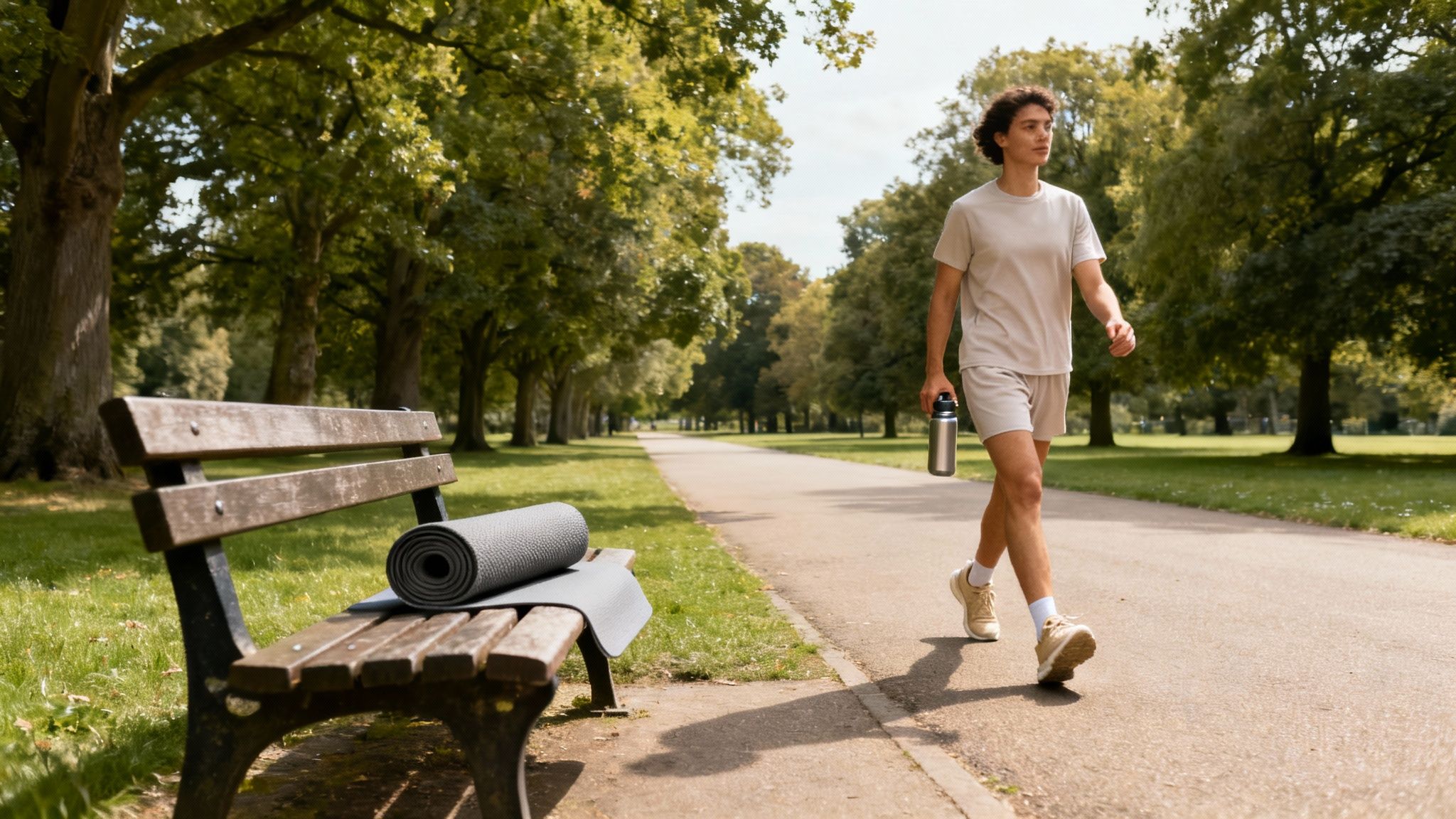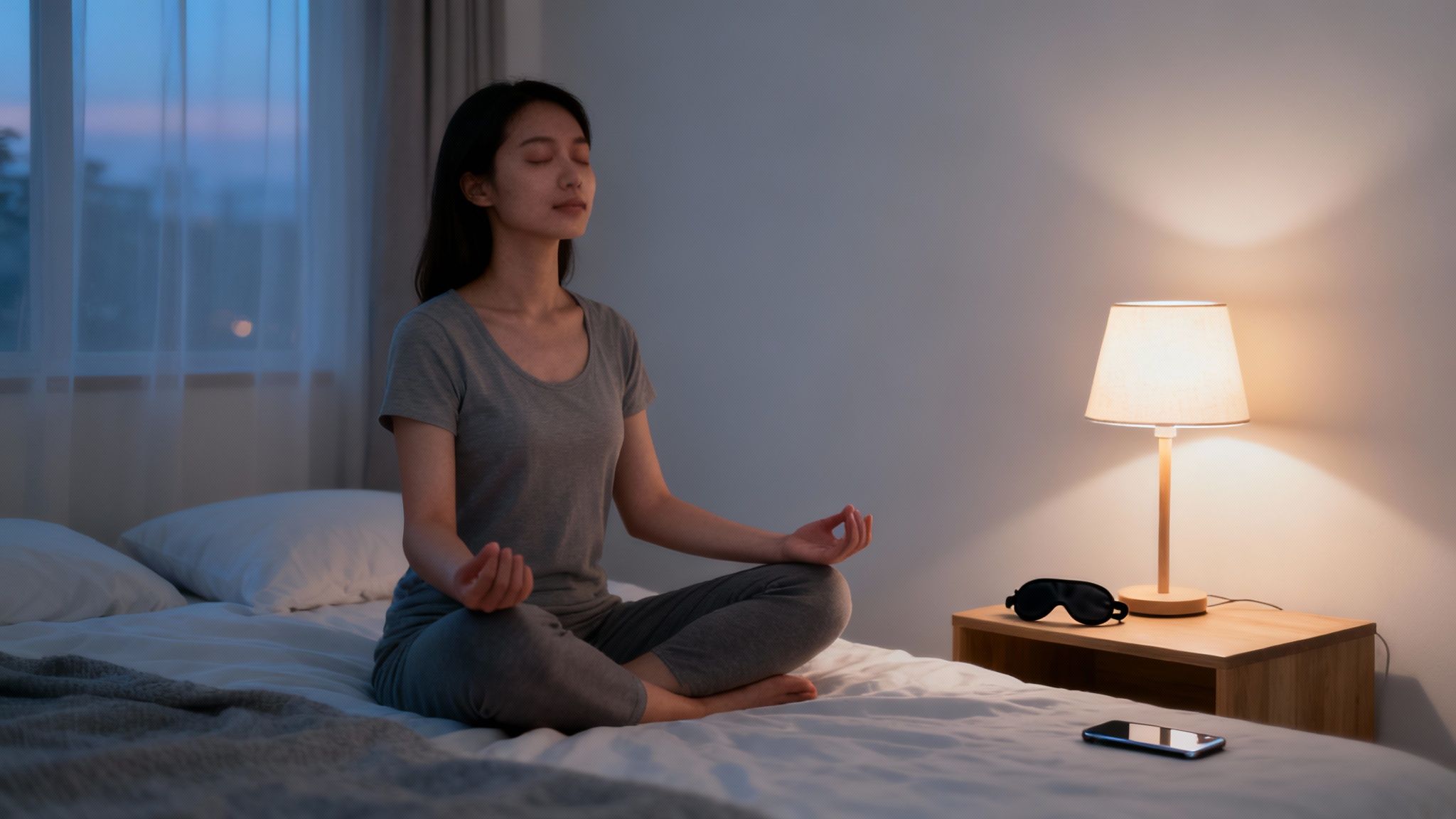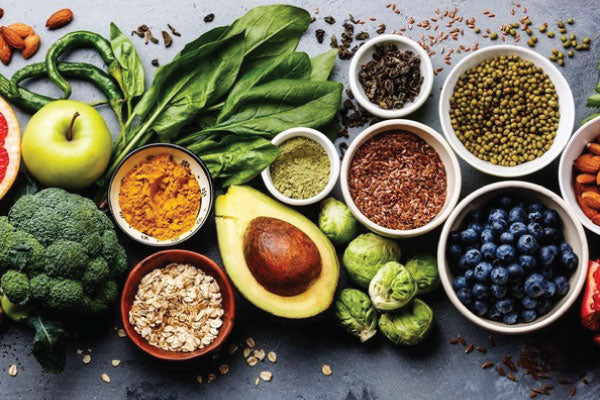To really get a handle on inflammation, you have to look at the bigger picture. It’s not about one magic pill or a single diet change. It’s about building a lifestyle around four key pillars: an anti-inflammatory diet, regular moderate exercise, good quality sleep, and getting your stress levels under control. Think of them as the legs of a table – they all work together to keep your body stable and healthy.
Why Chronic Inflammation Is a Silent Health Crisis
Inflammation isn’t inherently bad. When you get a cut or twist an ankle, that immediate swelling and redness is acute inflammation. It’s your body's natural, essential healing process kicking into gear. This is the "good" kind of inflammation; a targeted, short-term response that fixes the damage and then dials itself down.
The trouble starts when that "off" switch never gets flipped.
This is chronic inflammation – a persistent, low-grade fire that can smoulder away inside your body for months or even years. Unlike its acute cousin, the signs are often sneaky and easy to ignore. You might feel constantly tired, have nagging joint stiffness, or struggle with digestive issues, but nothing that screams for immediate medical attention. That’s what makes it so dangerous.
This prolonged state of emergency is largely a product of modern life. Diets loaded with processed foods, spending most of our days sitting down, constant stress, and poor sleep all fan the flames, keeping the body on high alert. Over time, this internal fire can start to damage healthy cells and tissues, quietly laying the groundwork for more serious health problems down the line.
The Scale of the Problem in the UK
The numbers on this are genuinely staggering. In the UK, chronic systemic inflammation has become a massive health issue. Projections suggest it will affect over 60% of adults by 2025.
That means more than three out of every five adults could be living with this low-grade inflammation, which is now understood to be a major trigger for many chronic diseases like heart disease, type 2 diabetes, and even dementia. You can learn more about the signs of chronic inflammation and why it's such a widespread concern.
This timeline really puts it into perspective, showing how unchecked inflammation can progress from a general feeling of being unwell to a serious health condition.

This visual shows the clear pathway: what starts as a silent, internal problem can eventually become a diagnosed chronic disease if you don’t step in and change course.
Taking Control of Your Health
Recognising this connection is the first real step towards taking back control of your health. It’s about spotting those often-missed signals from your body and intervening early. By making conscious, deliberate changes to your lifestyle, you can start to cool that internal fire.
The core idea is simple: give your body what it needs to thrive and remove the things that keep it in a state of alarm. This isn't about a quick fix; it's about making a sustainable shift in your daily habits.
The four pillars we'll be focusing on are your roadmap:
- Adopting an Anti-Inflammatory Diet: To flood your body with powerful, healing nutrients.
- Moving Your Body Consistently: To regulate inflammatory responses and get your blood flowing.
- Mastering Stress: To lower cortisol levels and give your nervous system a break.
- Getting Quality Sleep: To allow your body to properly repair and reset every single night.
Throughout this guide, we'll dive deep into each of these areas, giving you practical, actionable strategies to get you started on your journey.
Building Your Anti-Inflammatory Eating Plan
What you put on your plate is probably the most powerful tool you have for managing inflammation. This isn't about some miserable, restrictive diet. It’s about making smart, deliberate choices to give your body the right kind of fuel. The idea is simple: focus on whole, nutrient-packed foods that actively fight inflammation, while cutting back on the stuff that fuels the fire.
Think of it like this: every meal is a conversation with your cells. You can either send a calming, healing message or one that puts your body on high alert. Our goal is to consistently send those calming signals.
Don't feel overwhelmed. You can start small. Simply adding more colour to your meals and making a few easy swaps is a brilliant first step.
Foods That Fight Inflammation
Some foods are genuine powerhouses, packed with compounds like antioxidants and polyphenols that directly tackle inflammation. Making these a regular part of your weekly shop is the foundation of this entire approach.
- Oily Fish: Salmon, mackerel, sardines, and herring are loaded with omega-3 fatty acids (specifically EPA and DHA). These fats are incredible at telling your body to produce fewer inflammatory substances.
- Berries and Dark Fruits: Blueberries, blackberries, strawberries, and cherries get their gorgeous, rich colours from anthocyanins, a type of antioxidant with potent anti-inflammatory effects.
- Leafy Green Vegetables: Spinach, kale, and chard are nutritional heroes. They're brimming with vitamins and antioxidants that shield your cells from inflammatory damage.
- Nuts and Seeds: Walnuts, almonds, flaxseeds, and chia seeds offer a fantastic mix of healthy fats, fibre, and antioxidants. It's a triple-threat against inflammation.
- Turmeric and Ginger: These aren't just for flavour. Turmeric contains curcumin and ginger has gingerol – both are well-researched compounds known for their ability to block inflammatory pathways.
Getting these into your diet is easier than you think. Try throwing a handful of spinach in your smoothie, snacking on a few walnuts, or adding a pinch of turmeric to your soups.
Foods That Can Promote Inflammation
Just as some foods can cool things down, others can pour petrol on the fire. Pinpointing these and reducing how often you eat them is just as crucial. These foods often trigger an unnecessary immune response or contribute to insulin resistance, both of which are tightly linked to chronic inflammation.
The usual suspects are almost always ultra-processed products.
- Sugary Drinks and Snacks: Fizzy drinks, sweets, and pastries send your blood sugar on a rollercoaster, which can trigger the release of inflammatory messengers called cytokines.
- Refined Carbohydrates: Think white bread, white pasta, and most breakfast cereals. They've been stripped of their fibre, causing the same blood sugar spikes as pure sugar.
- Processed Meats: Sausages, bacon, and deli meats are often high in saturated fats and compounds called advanced glycation end products (AGEs), which are known to be pro-inflammatory.
- Certain Vegetable Oils: When consumed in excess, oils high in omega-6 fatty acids—like sunflower, corn, and soybean oil—can throw your body's fatty acid balance out of whack and promote inflammation.
If you're already dealing with a condition like arthritis, being mindful of what to limit is particularly vital. For more specific advice, you can read through our guide on arthritis foods to avoid.
The goal here isn't perfection or total elimination. It's about awareness and reduction. Just by reading labels and understanding what's really in your food, you give yourself the power to make better choices, one meal at a time.
This brings us to one of the most effective strategies for long-term success: making smart swaps. These small changes add up, leading to big health benefits without making you feel like you've completely upended your life.
A few simple, practical swaps can make a world of difference. Here’s a quick-glance table to help you get started.
Simple Swaps for an Anti-Inflammatory Diet
| Instead of This (Pro-Inflammatory) | Try This (Anti-Inflammatory) | Why It Helps |
|---|---|---|
| Sugary breakfast cereal | A bowl of porridge with berries and nuts | Provides slow-release energy, fibre, and antioxidants, preventing blood sugar spikes. |
| White bread sandwich | A wholemeal or rye bread sandwich with plenty of salad | Increases fibre intake, which is vital for gut health and helps regulate your immune system. |
| Crisps or biscuits for a snack | A handful of almonds or an apple | Swaps empty calories and refined carbs for healthy fats, fibre, and inflammation-fighting nutrients. |
| Fizzy drinks or sweetened juice | A glass of water, herbal tea, or green tea | Cuts your intake of refined sugar, a major driver of inflammation, and hydrates your body properly. |
By making these simple swaps, you are actively choosing a path that reduces inflammation, rather than feeling like you are depriving yourself.
Diet is a critical piece of the puzzle, yet it’s an area where many of us fall short. It’s shocking to learn that fewer than 30% of UK adults eat the recommended five portions of fruit and vegetables a day – a cornerstone of any anti-inflammatory strategy. Diets heavy in processed foods, sugar, and unhealthy fats are directly linked to promoting inflammatory pathways in the body.
When you start building your meals around colourful, whole foods and using these simple swaps, you create a powerful and sustainable plan to lower inflammation and boost your overall well-being.
Finding Your Balance with Movement and Recovery

While your diet lays the foundation, consistent movement is the next crucial piece of the puzzle for reducing inflammation in the body. Exercise can feel like a bit of a paradox. The right kind and amount will significantly lower chronic inflammation, but doing too much, too intensely, or without enough rest can completely backfire, piling more stress onto your system. The real secret is finding your personal sweet spot.
Regular, moderate exercise works wonders by improving circulation, which helps flush out inflammatory substances from your tissues. It also encourages your body to produce its own powerful anti-inflammatory molecules. The good news? You don’t need to become a marathon runner to get these benefits. In fact, gentle, consistent activity is often far more effective for long-term inflammation control.
The goal here is to make movement a sustainable part of your life, not just another source of stress.
Weaving More Movement into Your Week
Finding the time is often the biggest hurdle, but even small bursts of activity throughout the day really do add up. The most important thing is to choose something you genuinely enjoy, because you're far more likely to stick with it.
Here are some accessible forms of exercise well-known for their anti-inflammatory effects:
- Brisk Walking: A simple 30-minute walk, five times a week, can dramatically improve inflammatory markers. It’s low-impact, free, and easy to fit into a lunch break or after dinner.
- Cycling: Whether it's on a stationary bike or outdoors, cycling is a fantastic cardiovascular workout that's gentle on the joints.
- Light Strength Training: Using your own bodyweight, resistance bands, or light weights helps build muscle. Muscle tissue is metabolically active and plays a key role in regulating the body's inflammatory response.
- Yoga and Tai Chi: These mind-body practices combine gentle movement with deep breathing and mindfulness, which is brilliant for lowering stress-related inflammation.
For instance, if you have a desk job, try setting a timer to get up and walk around for five minutes every hour. Or, instead of meeting a friend for coffee, why not suggest a walk in a local park? These small shifts make consistent movement feel achievable rather than overwhelming.
The most effective exercise for reducing inflammation is the one you actually do consistently. It’s far better to do 20 minutes of something you love every day than to force yourself into a gruelling hour-long workout twice a week that you absolutely dread.
Embracing this mindset is fundamental to long-term success. It shifts exercise from a chore to a genuine form of self-care.
The Non-Negotiable Role of Recovery
This is the part so many people skip, and it’s arguably just as important as the movement itself. Exercise creates a temporary, acute inflammatory response—that’s actually how your muscles repair and get stronger. Recovery is what allows this process to complete successfully, preventing it from tipping over into chronic inflammation.
Without proper rest, you’re simply breaking your body down without giving it the chance to rebuild.
This is where active recovery and rest days become non-negotiable.
- Prioritise Rest Days: Schedule at least one or two days a week with no formal exercise. This doesn’t mean you have to be completely sedentary; a gentle stroll is perfectly fine.
- Incorporate Stretching and Mobility: Spend 10-15 minutes after each workout doing gentle stretches. This helps relieve muscle tension and improve blood flow, which really aids the repair process.
- Listen to Your Body: If you feel unusually sore, tired, or run-down, that’s a clear sign you need more rest, not a harder workout. Pushing through fatigue is a fast track to burnout and heightened inflammation.
For athletes and those who train intensely, optimising recovery is paramount. Many are exploring various methods to support this process. If you're interested in this area, you might find value in learning more about CBD for athletes and sports recovery as a potential aid.
Ultimately, balancing movement with dedicated recovery creates a powerful, positive cycle. You gently stress the body, then give it the time and resources it needs to adapt and become stronger and less inflamed. This approach ensures that your efforts to move more are healing, not harmful.
Mastering Stress and Sleep to Control Inflammation

You can have the perfect anti-inflammatory diet and exercise routine, but if you're not managing stress and sleep, you're only fighting half the battle. The relentless pace of modern life, with its constant pings and pressures, has a real, physical effect on your body. When we talk about how to reduce inflammation, getting a handle on your mental state and sleep quality isn't just a nice idea—it's absolutely essential.
The connection between your mind and body is incredibly powerful. When you're constantly stressed, your system is flooded with hormones like cortisol. A short burst is fine, but a steady drip of cortisol puts your immune system on permanent high alert. This eventually leads to the exact kind of low-grade, systemic inflammation we’re trying to stamp out.
It's a similar story with poor sleep. A bad night isn't just about feeling a bit groggy the next day; it's a missed opportunity for your body to carry out vital repair work. During deep sleep, your body actively works to lower inflammatory markers. Skimping on sleep denies you this crucial maintenance window, allowing inflammation to run unchecked.
Taming the Stress Response
You can't just eliminate stress from your life. What you can do is change how your body responds to it. The aim is to switch on your body’s relaxation response, giving it the all-clear to stand down from high alert. This is where simple, practical mindfulness techniques can make a world of difference.
- Practise Conscious Breathing: Feeling overwhelmed? Try "box breathing". Inhale for four seconds, hold for four, exhale for four, and hold again for four. Doing this for just two minutes can genuinely calm your nervous system.
- Get into Nature: Even a 20-minute walk in a local park can cause a significant drop in cortisol levels. It helps you disconnect from digital noise and reconnect with a more soothing environment.
- Set Firm Boundaries: This one can be the toughest, but it's often the most effective. Learn to say "no" to the extra things that drain you, and protect some non-negotiable time for yourself, even if it's only 15 minutes a day.
This isn't just theory; it has massive implications for physical health. People in the UK living with chronic inflammatory conditions often carry the double burden of physical and mental health struggles. In fact, recent research found that individuals with these conditions may have almost double the risk of developing anxiety, depression, and bipolar disorder. You can read more about the strong link between inflammation and mental health.
By actively managing your stress, you are directly intervening in a key pathway that drives inflammation. Think of it as turning down the thermostat on your body's inflammatory furnace.
These small, consistent actions send a powerful signal to your body that it’s time to stop fighting and start repairing.
Reclaiming Your Sleep
Good sleep is one of the most powerful anti-inflammatory tools we have, and it costs nothing. This isn't just about hitting a magic number of hours; it’s about the quality and consistency of that rest. Dialling in your sleep hygiene is one of the best investments you can possibly make in your long-term health.
Making a few tweaks to your environment and routine can completely transform your nights.
Craft a Restful Wind-Down Routine
About an hour before you plan to sleep, start sending clear signals to your body that it's time to switch off. This is not the time to be scrolling through social media or firing off one last work email.
- Dim the Lights: Lower the lighting in your home. This encourages your body to start producing melatonin, the hormone that makes you feel sleepy.
- Disconnect from Screens: The blue light from phones, tablets, and TVs is notorious for messing with melatonin. Put them away at least 60 minutes before bed.
- Find a Calming Activity: Read a physical book, listen to some chill-out music, take a warm bath, or do a few gentle stretches. Find what helps you unwind and make it a non-negotiable part of your evening.
Optimise Your Bedroom for Deep Rest
Your bedroom should be a sanctuary for sleep, not a multi-purpose living room. A few simple adjustments can make a huge difference.
- Keep It Cool: The ideal bedroom temperature for sleep is surprisingly cool, somewhere around 18°C (65°F).
- Make It Dark: Use blackout curtains or a good eye mask to block out every bit of light, as even small amounts can disrupt your deep sleep cycles.
- Minimise Noise: If you live somewhere noisy, consider using earplugs or a white noise machine to create a peaceful and consistent soundscape.
By tackling both stress and sleep, you’re hitting two of the biggest modern-day drivers of chronic inflammation head-on. These aren't overnight fixes, but foundational habits that, once you get them locked in, will pay dividends for your entire body for years to come.
Smart Supplement Use And When To See A Doctor

While sorting out your diet, movement, and sleep are the big wins for managing inflammation, it's natural to wonder what else might give you an edge. The supplement aisle can be a confusing place, but a handful of options do have some promising science behind them. It’s vital to remember that supplements are just that—supplementary. They're helpers, not heroes, and can never take the place of a solid, healthy lifestyle.
Before you start taking anything new, it's always smart to have a quick chat with your GP or another qualified health professional. This is especially true if you have any existing health issues or are on other medications. They can help you figure out if a supplement is a genuinely useful tool for you, or just another expense.
Evidence-Backed Supplements To Consider
No single pill is going to cure chronic inflammation, but some compounds have been studied for their ability to support your body's own anti-inflammatory defences. Here are a few of the most well-regarded options that can really complement your other efforts.
- Omega-3 Fatty Acids: Often found in fish oil, these are superstars for a reason. Specifically, the fatty acids EPA and DHA have powerful anti-inflammatory properties that help balance out the pro-inflammatory omega-6 fats so common in modern diets.
- Curcumin (from Turmeric): This is the active compound that gives turmeric its bright yellow colour. Curcumin is a potent antioxidant that has been shown to block some of the key molecules that kickstart inflammation.
- Ginger: A close cousin of turmeric, ginger contains a compound called gingerol. It's been used for centuries for its health benefits and is well-known for helping to dial down inflammatory responses in the body.
When you're buying supplements, quality really matters. The effectiveness of something like curcumin, for example, is often much better when it's combined with black pepper (piperine), which helps your body absorb it far more efficiently. Look for reputable brands.
The Conversation Around CBD
Over the last few years, CBD (cannabidiol) has become incredibly popular as a wellness product, and many people report that it helps them with pain, sleep, and inflammation. Here in the UK, CBD products are legal as long as they contain virtually no THC, which is the psychoactive compound in cannabis.
The research into exactly how CBD works against inflammation is still unfolding. The current thinking is that it interacts with the body's endocannabinoid system, a complex network that helps regulate things like our immune response and how we perceive pain. If you want to go deeper, you can learn more about how to use CBD for inflammation with natural relief strategies in our detailed guide. It's a complex topic but one that holds a lot of promise for people looking for natural support.
When To See Your Doctor
Taking control of your health is brilliant, but it's no substitute for professional medical advice. There are some very clear red flags that mean it's time to stop guessing and book an appointment with your GP. Pushing through persistent or severe symptoms on your own isn't just tough; it could delay getting a proper diagnosis.
You should always seek medical advice if you're experiencing any of these:
- Persistent Joint Pain and Swelling: Stiffness, pain, or swelling in your joints that hangs around for more than a few weeks and isn't from a specific injury.
- Chronic Fatigue: Feeling a level of tired that just doesn't get better with rest and is getting in the way of your daily life.
- Unexplained Digestive Issues: Ongoing problems like stomach pain, bloating, or changes in your toilet habits.
- Recurring Skin Rashes: Conditions like psoriasis or eczema that aren't clearing up with over-the-counter creams.
Your doctor can run specific tests to get a much better idea of what's going on. One of the most common is a blood test for C-reactive protein (CRP). This is a marker of inflammation produced in the liver. If your CRP levels are high, it tells your doctor there's an inflammatory process happening somewhere in your body, which helps them decide on the next steps.
Making that appointment doesn't mean your lifestyle efforts have failed. It's the opposite—it means you're being responsible and taking a proactive step to get the full picture and the right care.
Your Questions About Reducing Inflammation Answered
When you start digging into how to reduce inflammation, a lot of questions pop up. It's completely normal. To help you put all this knowledge into practice with a bit more confidence, let's tackle some of the most common queries we hear.
How Long Does It Take To Reduce Inflammation?
This is the big one, and the honest answer is: it depends. Everyone's body is different. Your unique biology, how long the inflammation has been simmering away, and how consistently you stick with these new habits all play a massive part.
Some people feel a real shift in their energy, digestion, or joint comfort within just a few weeks of overhauling their diet. That’s fantastic, but for the deeper, systemic changes that show up in blood tests like CRP, you're realistically looking at three to six months of consistent effort.
The key is to see this as a long-term strategy for your health, not a quick fix. Consistency will always beat short-term perfection. Small, daily improvements are what build powerful momentum over time.
What Is The Single Most Effective Way To Reduce Inflammation?
Everyone's looking for that one magic bullet, but a truly effective approach needs to be multi-faceted. If you twisted my arm and made me pick just one starting point, it would have to be your diet. What you eat provides the literal building blocks for your body's response systems. You can't out-train a bad diet, as they say.
But the real magic happens when you combine all the key pillars:
- An anti-inflammatory diet packed with whole foods is your foundation.
- Regular, moderate exercise helps to keep your immune system in check.
- Quality sleep is non-negotiable; it's when your body does its most important repair work.
- Managing stress is crucial for lowering cortisol and calming your entire system.
Think of it less as a checklist and more as an interconnected system. When you improve one area, it genuinely makes it easier to get the others dialled in.
Can Drinking Water Help Reduce Inflammation?
Absolutely. It sounds almost too simple, but staying properly hydrated is a cornerstone of managing inflammation. Water is vital for nearly every process in your body, especially for flushing out waste and toxins that can fuel an inflammatory state.
When you're dehydrated, it puts a strain on your entire system. That stress alone can trigger the release of inflammatory messengers as your body struggles to function properly. For most adults in the UK, aiming for around two litres of water a day is a solid target.
Are There Specific Drinks That Fight Inflammation?
Yes! Beyond just plain water, certain drinks are loaded with potent compounds that can actively help your body in the fight against inflammation. Adding these into your routine is a great way to boost your efforts and add a bit of enjoyable variety.
A few excellent choices include:
- Green Tea: It's brimming with powerful antioxidants called polyphenols. One in particular, EGCG, is well-studied for its impressive anti-inflammatory effects.
- Ginger Tea: You can make this easily from fresh ginger root. It harnesses the power of a compound called gingerol to soothe the digestive system and dial down inflammatory signals.
- Turmeric Lattes: A warm, comforting drink made with turmeric (and always a pinch of black pepper to help your body absorb it) delivers curcumin right where it's needed.
At SMOKO CBD, we're committed to providing high-quality, lab-tested CBD products to support your wellness journey. If you're exploring natural ways to manage pain, improve sleep, or find your calm, discover our UK-made CBD range at https://smokocbd.com.









